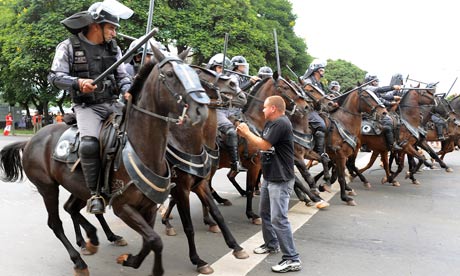From his 19th-floor newsroom Eurípedes Alcântara enjoys a spectacular view over the "new Brazil"; helicopters flit through the afternoon sky, shiny new cars honk their way across town, tower blocks and luxury shopping centres sprout like turnips from the urban sprawl.
But Alcântara, one of the country's most powerful journalists, also stares out at the old Brazil; a place of political wheeler-dealing, kick-backs and endemic corruption that costs billions each year and continues to slow the rise of this South American giant.
As executive editor of the influential and divisive news weekly Veja, Alcântara believes it is his calling to stop the sleaze. "It is a civilisational clash. What kind of country do we want to be?" he said.
"The majority of people play by the rules, they work from sunrise to sunset and pay their taxes as much as they can. Yet another portion lives dangling off the state apparatus, living off deals with people who have the keys to the safe. We see [uncovering corruption] as our mission."
2011 will go down in Brazilian history as the year that Dilma Rousseff, its first female president, came to power. But it may also be remembered as the year in which public frustration over rampant political corruption finally boiled over.
Since Rousseff came to office in January, five ministers have been toppled by ethics or corruption scandals, the latest being Orlando Silva, the sports minister, who resigned on Wednesday after Veja alleged he was involved in a £14m corruption racket.
Nationwide protests, while timid compared to those in Chile or the Middle East, have brought tens of thousands to the streets to demand an end to the looting of public money.
With the word corruption on everyone's lips, the Brazilian media has played a lead role in unearthing the wrongdoings of some of the country's most powerful politicians. In June Rousseff's powerful chief-of-staff, Antonio Palocci, was forced to resign after the Folha de São Paulo newspaper revealed his personal fortune had grown 20-fold in a four-year period.
Three months later the same newspaper helped dethrone the country's tourism minister, Pedro Novais, 81, who had previously been accused of using public money to bankroll a late-night party inside a sex-motel called The Caribbean. Novais's bill at the motel – where rooms fitted with swimming pools, saunas and circular beds are rented for £35 for three hours – reportedly came to around £767.
Veja's reporting, meanwhile, has brought down the agriculture minister Wagner Rossi, accused of misusing public money, the transport minister, Alfredo Nascimento, with an expose detailing an alleged bribery scheme within his ministry, and this week the sports minister.
"[The politicians] all say: 'When I get a call from Veja it's because my life is about to get worse," Alcântara chuckled. "[But] it brings me no pleasure … I don't see it as a victory."
"It's not a campaign … but it is an obsession," added the 55-year-old editor, whose latest front page carried the headline Ten Reasons to Get Angry About Corruption. The inside story pointed out that with the R$85bn (£30bn) of public money siphoned off each year, the government could eradicate poverty, build 1.5m homes – or purchase 18m designer handbags.
Alcântara – whose magazine claims a weekly circulation of 1.2m and an estimated readership of between 6 and 10 million – admitted that most of Veja's corruption scoops originated from tipoffs from people often themselves implicated in the murky underbelly of Brazilian politics.
"We don't have a Delta Force. We have receptors," he said, pointing to the magazine's newsrooms in São Paulo, Rio de Janeiro and the political capital, Brasília, where 78 reporters were instructed to keep their eyes and ears open for signs of dodgy dealings, whether covering science, transport or the arts.
Untangling Veja's own politics from its anti-corruption crusade is complex.
The magazine is widely loathed by Brazil's left, who claim it is inherently biased against the ruling Workers' party and its allies, and pays undue attention to the peccadilloes of politicians from these parties, while brushing over those of its friends.
Luiz Inácio Lula da Silva, Brazil's first working-class president, enjoyed a particularly turbulent relationship with the magazine during his eight years in office. "Let's be frank, some of Veja's journalists deserve the Nobel prize for irresponsibility," Lula said in 2006, following a story claiming that he and his allies held secret overseas bank accounts. "Veja does not publish accusations. Veja publishes lies."
Alcântara has kinder words for Rousseff, Lula's successor, who has embarked upon what has been dubbed a "house cleaning", ejecting a total of six ministers during her 10 months in power.
"It seems to me that she is much more intolerant with corruption than [Lula]," he said. "Dilma, in both word and action, has shown much greater intolerance and a greater understanding of the disgrace that corruption is in this country. There now exists a strong awareness, and I think much of it is down to the president, that this kind of extortion is unacceptable."
Rousseff's stance against sleaze and the near constant media coverage has bolstered a wave of protests across Brazil.
"How is it that such a rich, large country has such high levels of poverty? One of the explanations without doubt is endemic, historic corruption," said Antônio Carlos Costa, head of the anti-violence NGO Rio de Paz during one recent event, which drew around 2,500 protesters.
"We are talking about something that links all the spheres of power. That goes from the narco-traffickers to the members of congress. It pollutes everything; it undermines all our relationships. The only way to combat this is with dedication and perseverance."
Natalia Lebeis, 23, had also turned out for the protest – dressed as a clown.
"People say Brazilians only take to the streets to watch football or for carnival," she said. "We are the voice of our nation. I think it's time for people to show their faces and speak out against corruption and impunity."
Alcântara, a one-time New York correspondent whose latest story was a three-page interview with Neil Young, looked to Paul McCartney to capture his feelings on Brazil's chances of winning its war on graft.
"It is a tug-of-war," he said, referring to the ex-Beatle's 1982 track. "A tug-of-war between those who want to take us back into the 19th century and those trying to pull us into the 21st century. I'm an optimist – I think the 21st century will win."








